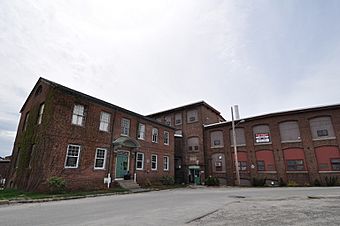Crompton Mill Historic District facts for kids
Quick facts for kids |
|
|
Crompton Mill Historic District
|
|
 |
|
| Location | West Warwick, Rhode Island |
|---|---|
| Area | 5.12 acres (2.07 ha) |
| Built | 1807 |
| NRHP reference No. | 06000577 |
| Added to NRHP | July 14, 2006 |
The Crompton Mill Historic District is a special area in West Warwick, Rhode Island. It's home to a group of old factory buildings that tell an important story about how things were made long ago. This district is located near the Pawtuxet River and includes streets like Pulaski, Remington, and Manchester.
Contents
The Crompton Mill Story
The Crompton Mill Historic District is a collection of old factory buildings. Most of these buildings are made of brick. They are found in the village of Crompton. This area was once a busy center for making textiles.
What is the Crompton Mill?
The Crompton Mill complex is a group of historic buildings. It is located at 20 Remington Street, 53 and 65 Manchester Street. These buildings are next to the Pawtuxet River. The mill complex used to be on both sides of the river. However, the buildings on the west side were destroyed by a fire in 1992.
A Look Back: Early Days
The oldest parts of the mill complex are the dam and the raceways. Raceways are channels that carry water. They were built in 1807. These channels helped power the mills using water from the river. The current dam was built in 1908. It replaced an older dam from 1882.
The Oldest Building
Mill No. 1 is a very old stone building. It was built in 1807. Many people believe it is the oldest stone mill building in Rhode Island. Most of the other buildings in the complex were built later. They were constructed in the late 1800s and early 1900s. Companies like the Providence Manufacturing Company built them.
What Happened to the Mill?
The Crompton Mill was mainly used to process textiles. This means they made fabric, mostly from cotton. The mill operated for many years. However, in 1946, the Crompton Corporation stopped making products there. This marked the end of an era for the mill.
A Special Place in History
Because of its important history, the Crompton Mill Historic District was recognized. It was added to the National Register of Historic Places in 2006. This list includes places that are important to American history. It helps protect them for future generations.



